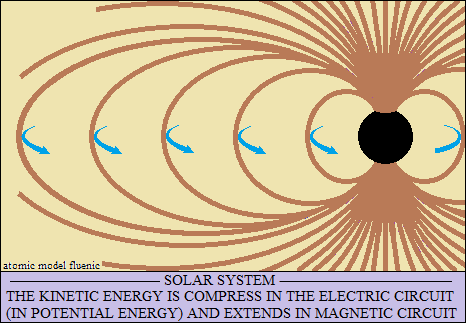Reasons of thinking
People have wondered (and wonder): Why is there anything, rather than
nothing?
Since 1975, I have been intrigued by the interpretation of electricity
through currents
of electrical charges, electrons and gaps and of the law of universal
attraction.
These phenomena motivated my thoughts.
In the distance interaction between two bodies (magnets), even in vacuum,
where "there is nothing", is clearly seen, energy with vector
properties (limit of knowledge).
Energy emanating from the two bodies!
Therefore, bodies are structures of energy with vector properties.
Or, the interactions of vector properties form structures – matter.
What are the properties of vectors?
Imaginary, the vector has as an arrow symbol, representing the properties:
plus and minus polarities; direction; sense; the forces and speed of the
interactions.
Forces: polarities of opposite sign vectors are attracted,
and polarities of the same sign are rejected.
The forces of attraction are perpendicular to the forces of rejection.
To these properties is added the property of orthogonality.
The forces of attraction unite the polarities of the vectors in closed
circuit (circular).
With the property of orthogonality, the vectors orthogonally surround
the circuit with another closed circuit, generating the centripetal
force.
The centripetal force is oriented perpendicular to the forces of attraction
and rejection.
Although circuits are identical (vectors joined by their forces)
we call them electric and magnetic.
The centripetal force is therefore the electromagnetic force.
Electricity and magnetism are a lot of parallel vector circuits,
which propagate by their force of rejection.
Electricity propagates around magnetism and magnetism around the electric
circuit.
These forces reach a balance, around which they oscillate.
This is the double torr oscillator - the hydrogen atom.
The double torr oscillator, the hydrogen atom,
implicitly contains the nature of electricity, magnetism and of the forces.
Electricity, magnetism and forces are the properties of vectors.
The configuration of the hydrogen atom has three hypostasis:
of stationary oscillator; of traveling oscillator and of electromagnet.
The stationary oscillator hypostasis is characterized by the symmetry
of the oscillations.
The variation of kinetic / potential energy is induced symmetrically in
circuits.
Kinetic energy emits the frequency spectrum characteristic of the hydrogen
atom.
Obviously, hydrogen atoms make up the atoms of the elements.
The hypostasis of the traveling oscillator is characterized by
asymmetrical oscillations.
One circuit induces all the energy into the other circuit, from which
it does not return,
generating new circuits with linear and rotational motion.
It is reflected in a similar way to the "ball-bearing motor oscillations".
The traveling oscillator constitutes the laser beam.
The hypostasis as electromagnet is characterized by the lack of
oscillations.
One of the circuits of the oscillator propagates entirely on the other
circuit,
becomes magnetism with polarities and stops the oscillations.
The kinetic energy is compress in the electric circuit
(in potential energy) and extends into the magnetic circuit.
The hydrogen atom, in the electromagnet hypostasis is the stars model.
But, stars develop without limits, forming systems and galaxies,
The analysis of the phenomena with this interpretation, produced many
surprises:
Surprise of the true nature of electricity, of magnetism and of forces.
Surprise of the electromagnetic force.
Surprise of angular electromagnetic force.
The surprise of the simplicity of the interactions into the PN junction.
The surprise of the notion of space.
The Surprise of the notion of time.
And the surprise of the internal structure of the sun.

